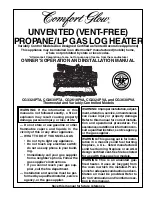
15
MIXInG valves
Water temperature over 125°F (52°C)
can cause severe burns instantly
resulting in severe injury or death.
Children, the elderly and the
physically or mentally disabled are at
highest risk for scald injury.
Feel water before bathing or
showering.
Temperature limiting devices such as
mixing valves must be installed
when required by codes and to
ensure safe temperatures at fixtures.
Water heated to a temperature which will satisfy clothes washing, dish
washing, and other sanitizing needs can scald and cause permanent
injury upon contact. Short repeated heating cycles caused by small
hot water uses can cause temperatures at the point of use to exceed
the water heater’s temperature setting by up to 20°F (11°C).
Some people are more likely to be permanently injured by hot water
than others. These include the elderly, children, the infirm and the
physically/mentally disabled. Table 1 shows the approximate time-
to-burn relationship for normal adult skin. If anyone using hot water
provided by the water heater being installed fits into one of these
groups or if there is a local code or state law requiring a certain
water temperature at the point of use, then special precautions must
be taken.
In addition to using the lowest possible temperature setting that
satisfies the demand of the application a Mixing Valve should be
installed at the water heater (see Figure 8) or at the hot water taps
to further reduce system water temperature.
Mixing valves are available at plumbing supply stores. Consult
a Qualified Installer or Service Agency. Follow mixing valve
manufacturer’s instructions for installation of the valves.
table 1
Water Temperature
Time to Produce 2nd & 3rd
Degree Burns on Adult Skin
160°F (71°C)
About 1/2 second
150°F (66°C)
About 1-1/2 seconds
140°F (60°C)
Less than 5 seconds
130°F (54°C)
About 30 seconds
120°F (49°C)
More than 5 minutes
dIshwashInG MachInes
All dishwashing machines meeting the National Sanitation
Foundation requirements are designed to operate with water flow
pressures between 15 and 25 pounds per square inch (103 kPa
and 173 kPa). Flow pressures above 25 pounds per square inch
(173 kPa), or below 15 pounds per square inch (103 kPa), will result
in improperly sanitized dishes. Where pressures are high, a water
pressure reducing or flow regulating control valve should be used in
the line to the dishwashing machine and should be adjusted to deliver
water pressure between these limits.
HOT WATER
OUTLET
TO TANK
INLET
CHECK
VALVE
MIXING
VALVE
COLD
WATER
INLET
TEMPERED WATER
OUTLET
12” TO 15”
(30-38 cm)
CHECK
VALVE
fIGure 8.
space heatInG and potable water sYsteM
Your water heater is equipped with inlet/outlet connections for use in
space heating applications (see Figure 9). If this water heater is to be
used to supply both space heating and potable (drinking) water, the
instructions listed below must be followed:
• Be sure to follow the manual(s) shipped with the air handler or other
type heating system.
• This water heater is not to be used as a replacement for an existing
boiler installation.
• Do not use with piping that has been treated with chromates, boiler
seal or other chemicals and do not add any chemicals to the water
heater piping
• If the space heating system requires water temperatures in excess
of 120°F, a tempering valve (provided) must be installed per the
manufacturer’s instructions in the potable hot water supply to limit
the risk of scald injury.
• Pumps, valves, piping and fi ttings must be compatible with potable
water.
• A properly installed flow control valve is required to prevent
thermosiphoning. Thermosiphoning is the result of a continuous
flow of water through the air handler circuit during the off cycle.
Weeping (blow off) of the temperature and pressure relief valve (T
& P) or higher than normal water temperatures are the fi rst signs
of thermosiphoning.
• The hot water line from the water heater should be vertical past any
tempering valve or supply line to the heating system to remove air
bubbles from the system.
• Do not connect the water heater to any system or components
previously used with non-potable water heating appliances when
used to supply potable water.
Summary of Contents for GP6 50 120
Page 5: ...5 general safety information ...
Page 56: ...56 notes ...
Page 57: ...57 notes ...
Page 58: ...58 notes ...
















































